POP MUSIC STARS and THE MOVIES
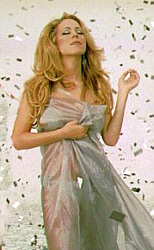
If you're a humongous pop music megastar like Britney Spears, who dazzles on radio, television and recordings and sees her glamorous face smiling from the covers of scores of magazines week after week, it must be a giant pain in the keister to know you're considered a colossal dud when it comes to movies.
Though Spears has been in front of cameras nearly all her performing life, her 2002 debut movie "Crossroads" was a mammoth turkey at the box office. She may as well have been a nobody from Septic Springs, Arkansas.
Truth is, though, Britney's bomb-arooney as a movie star isn't necessarily a bad reflection on her career. Crossing over from pop music stardom to movie stardom is a killer assignment, no matter how big you are as a pop phenomenon. Very few pop music stars have done it--and been able to add the term "movie star" to their resumes.
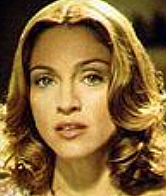
Pop Diva Mariah Carey, for instance, received a big, red "X" for her 2001 movie "Glitter," which was scorned by critics and ignored by moviegoers. Self-proclaimed "king of pop" Michael Jackson wowed critics and fans in his first starring movie "The Wiz," but that was more than a quarter century ago. Where did his "movie" career go?
And how about Madonna? She had good notices for her debut in "Desperately Seeking Susan" in 1985 and made several other films that seemed to indicate she had movie star potential, among them "Dick Tracy" (1990), "A League of Their Own" (1992) and "Evita" (1996), but anyone who describes Madonna as a movie star these days runs the risk of being hooted out of the room. Too many people may remember her many screen bombs like "Shanghai Surprise," (1986), "Who's That Girl?" (1987) and "Swept Away" (2002).
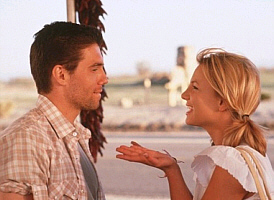
Why should Britney, Mariah, Michael or Madonna really care? I mean, aren't they filthy rich from their recordings and all the other ancillary profit centers of their celebrityhood? Well, perhaps they remember all the pop stars of the past whose string of hits finally came to an end, leaving them in no demand whatsoever except for those occasional "whatever happened to..." specials or pop music nostalgia shows on PBS.
Perhaps they realize that being rich is cool, but being "over with" is intolerable for somebody who's been a superstar. Maybe they also remember the glittering examples like Cher, a pop star in the 1960s that most everybody thought would fade away quickly once she divorced Sonny Bono and broke up their act. But Cher tried hard for a movie career, proved her merit as a serious actress in a series of supporting roles, then won the Best Actress Academy Award in 1987 for "Moonstruck." Cher's music career continued to flourish, but the Oscar made her a genuine movie star, even if she's only made a handful of movies since. Now she's a pop icon, a status only a handful ever achieve.
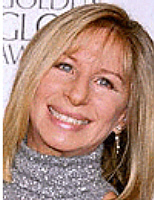
Another who did was Barbra Streisand, who was a recording sensation in the 1960s, then won a Best Actress Oscar in her movie debut, playing Fanny Brice in "Funny Girl." Streisand parlayed that success into a genuine movie career that kept her in full bloom as a superstar long after her music fell from the pop charts onto the "easy listening" charts and her recording career slowed to a crawl. (Streisand is the only pop icon to win TWO Oscars. She won her second as the composer, with Paul Williams, of "Evergreen" from the 1976 movie "A Star is Born," named Best Song at the 1976 Academy Awards.)
Streisand's co-star in that 1976 "A Star is Born" was another pop idol, Kris Kristofferson, who turned to acting in 1970 at the peak of his popularity as a singer-composer of pop/country hits like "Me & Bobby McGee" and "Help Me Make It Through the Night." Kristofferson has maintained a very strong presence in movies ever since, moving from star roles to character parts, dividing his time equally between his acting and recording careers.
If there's a secret pop music stars could learn about crossing over to movie stardom, it probably would be: Learn to act. Many pop and rock headliners have established themselves as good actors, even if they didn't become box office stars in the movies. That means they can continue to work in both movies and music, a versatility that almost always means longer, more profitable careers.
Consider the case of Sting, the lead singer for The Police, a phenomenally popular British rock band from the 1970s. Sting plunged into movies in supporting roles and scored well with critics in films like David Lynch's "Dune" (1984), "Plenty" (1985) with Meryl Streep and "The Bride" (1985) as Dr. Frankenstein. Long after The Police broke up and Sting became a single act, he has been able to keep busy with both his music and occasional movie roles, almost always well-received by critics.
A similar example would be that of English rockster David Bowie whose starring performance in Nicolas Roeg's "The Man Who Fell to Earth" (1976) received rave reviews. He followed that with strong performances insuch films as "Merry Christmas, Mr. Lawrence" (1983) and "The Hunger" (1983) with Catherine Deneuve and Susan Sarandon. That early work marked Bowie as a man who could perform exceptionally well in both movies and music.
Still, the crossover giants of an earlier time were something else--pop music stars so big in movies that people began thinking of them as movie stars who also sang: Bing Crosby, who won the Best Actor Oscar for 1944's "Going My Way" and was a top box office star for a decade; Frank Sinatra, who won the Best Supporting Actor Oscar for "From Here to Eternity" (1953) in a straight dramatic role that rekindled his dormant movie career and mad him a top movie draw; Doris Day, a big band singer of the 1940s with dozens of No. 1 pop hits, who became a movie star in 1948, earned a Best Actress nomination for 1959's "Pillow Talk," and kept her name above the title in every movie she ever made in a long, long screen career; Dean Martin, a pop music star of the 1950s who broke into movies as straight man to comic Jerry Lewis, then struck out on his own as a dramatic actor in hit movies like "Some Came Running," "The Young Lions" and "Toys in the Attic." All four achieved icon status in show business--and it's doubtful that would have happened without their movie success.
Like most of the pop stars of today, Crosby, Sinatra, Day and Martin all sang in their first few movies. In those days, musicals were a popular movie genre. Today they're extremely rare--and most are adaptations of Broadway musical shows like last year's Oscar winner "Chicago." Films built around a pop star who's making his or her screen debut were common in the 1940s and 1950s, but they're few and far between today.
In 1956, when rock phenomenon Elvis Presley made his movie debut in "Love Me Tender," the pop star "vehicle" was still a viable movie genre. It wasn't necessary for the performer to learn how to act as long as his or her fans continued to flock to the theaters. But no other rock star of the 1950s had the enduring appeal of Elvis, who made 30 movies, almost all of them musicals. His contemporaries, such as Pat Boone, Tommy Sands, Fabian and Connie Francis, starred in a few movies, but their recording careers barely lasted long enough for the movies to reach theaters.
Racism also surely held back certain popular black recording stars who demonstrated exceptional acting ability. Harry Belafonte, who was a chart-topper in the 1950s with his folk tunes like "The Banana Boat Song," landed a few big roles in pictures like "Island in the Sun" (1957), "The World, The Flesh and The Devil" (1959) and "Odds Against Tomorrow" (1959), but nothing much came of his acting career. Despite his movie star looks and good reviews for his acting, Belafonte came along at a time when much of white America simply refused to buy tickets for movies starring black men.
The most popular African -American pop star of his generation--Nat "King" Cole--landed small parts in several movies, usually playing himself during a musical interlude, but finally won some co-starring or leading roles in dramas like "China Gate" (1957) with Gene Barry and Angie Dickinson and "St. Louis Blues" (1958), in which he played composer W.C. Handy in a film with a mostly black cast. But by "Cat Ballou" (1965), he was relegated to the role of a strolling minstrel, even though he was still a popular recording star.
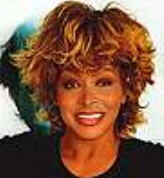
Racism probably wasn't a factor in the fizzle of black musical volcano Tina Turner's movie career after the very hot r&b star earned standout notices as the Speed Queen in the 1975 movie version of The Who's rock opera, "Tommy." Turner showed plenty of movie star potential later as the Queen of Bartertown opposite Mel Gibson in "Mad Max Beyond Thunderdome" (1985), but she was offered few roles afterward and her movie career slipped away.
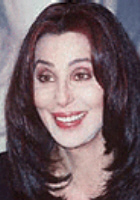
her Oscar for 1987's
'Moonstruck.'
By the 1970s, it was still possible for a pop music star to get a movie tailored for him or her, but it was extremely unlikely that the performer would get a follow-up movie. A more likely scenario would be a "performance" movie like The Beatles' "A Hard Day's Night" (1964), which didn't require the Fab Four to exercise any acting chops. Their example was quickly followed by Gerry and the Pacemakers with "Ferry Cross the Mersey" (1965), Sonny & Cher with "Good Times" (1967) and so on. These films had minimal storylines and just gave the pop stars an opportunity to clown around and do their thing in between tunes.
However, Hollywood almost accidentally discovered a new movie star when it brought beautiful Olivia Newton-John over from the pop charts to play opposite John Travolta in the movie version of Broadway's "Grease" in 1978. The response to Olivia was sensational in that fabulously successful musical and she was quickly rushed into her own starring vehicle, "Xanadu" (1980) with musical movie icon Gene Kelly. After that bombed, Olivia was re-teamed with Travolta in "Two of A Kind" (1983), another box office turkey, and that was pretty much that for her movie career.
Another recording star who made a sensational movie debut in 1980 was Dolly Parton, the buxom country star who was in the midst of a successful crossover onto the pop charts. Teamed with Jane Fonda and Lily Tomlin in the box office comedy smash "Nine to Five," Parton drew magical reviews and was deluged with movie offers. But she never found the right follow-up vehicle, turning instead to a series of popular made-for-TV movies and the occasional big screen vehicles like "Rhinestone" (1984) and "Straight Talk" (1992), which made no waves at the box office.
Most critics proclaimed Parton a "natural" on the screen, but perhaps the demands of her performing career, her television success and the changing tastes of the pop marketplace kept her from taking advantage of what many felt was a very special opportunity to reach genuine movie stardom.
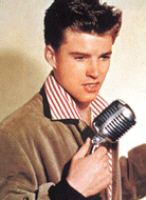
In contrast, some pop stars get magnificent opportunities to make it in movies, but just can't deliver. A classic case: Teen idol Rick Nelson, who landed a leading role in the all-star western "Rio Bravo" (1959) with John Wayne, Dean Martin and Angie Dickinson. Nelson was embarrassingly bad, despite his many years as an "actor" in his parents' radio and TV series, "The Adventures of Ozzie and Harriet." Nelson made other movies, but never showed any acting talent. (However, Rick's daughter, Tracy, is a talented actress who has starred in several TV series.)
Another Nelson who has scored some acclaimed roles in movies: Country music star Willie Nelson. Despite being short, grizzled and gray, Nelson showed star potential in dramatic supporting roles in "The Electric Horseman" (1979) and "Thief" (1981) while also doing quite well as the star of music-related films like "Honeysuckle Rose" (1980) and "Songwriter" (1985).
Over the years, there have been many examples of recording stars who seemed destined for long movie careers, but just never made it. More often, though, the pop stars have just gone to the movies, done pretty much what they were doing already, and made no particular impression on anyone except their diehard fans.
Here's a chart showing how some other popular recording stars have done in the movies:
|
of the late 1950s and 1960s who was a chart-topper with hits like "Venus" |
|
|
country hits like "Wichita Lineman," "Rhinestone Cowboy," "Gentle on My Mind" |
|
|
|
|
|
|
|
|
|
|
|
|
|
|
"Rocky Mountain High" |
|
|
|
from "Wonder Boys" (2000) |
|
|
|
|
|
"The Big Country." |
|
|
"Gimme Shelter" (1970) |
|
|
|
|
|
|
|
|
|
|
|
|
|
|
|
|
|
after that. |
|
|
|
|
|
|
